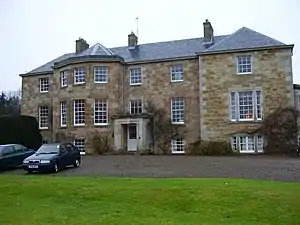Patrick Stuart (British Army general)
General The Hon. Sir Patrick Stuart GCMG (10 June 1777 – 7 February 1855) was a British Army officer who became Governor of Malta.
Sir Patrick Stuart | |
|---|---|
.jpg.webp) Sir Patrick Stuart | |
| Born | 10 June 1777 |
| Died | 7 February 1855 (aged 77) Eaglescairnie House, East Lothian |
| Allegiance | |
| Service/ | |
| Rank | General |
| Battles/wars | Napoleonic Wars |
| Awards | Knight Grand Cross of the Order of St Michael and St George |
Military career
Born the son of the 10th Lord Blantyre, Stuart was commissioned into the 2nd Regiment of Life Guards in 1794.[1] He became inspecting field officer of the militia in the Ionian Islands in 1816.[1] He went on to be Commander-in-Chief, Scotland in 1830 (and from 1836, Governor of Edinburgh Castle)[2] and Governor of Malta in 1843 before retiring in 1847.[1]
He served as Colonel of the 44th (East Essex) Regiment of Foot from 1843 until his death[3] and was promoted to full general in 1851.[1]

Eaglescairnie House: home of Sir Patrick Stuart
He died at his home, Eaglescairnie House in East Lothian, on 7 February 1855.[1] His will is in the National Archives.[4]
References
- The Gentleman's magazine
- "No. 19398". The London Gazette. 8 July 1836. p. 1249.
- "44th (East Essex) Regiment of Foot". regiments.org. Archived from the original on 29 December 2006. Retrieved 12 July 2016.
- National Archives
| Military offices | ||
|---|---|---|
| Preceded by Sir Robert O'Callaghan |
Commander-in-Chief, Scotland 1830–1837 |
Succeeded by Lord Greenock |
| Preceded by The Duke of Gordon |
Governor of Edinburgh Castle 1836–1837 | |
| Preceded by Gore Browne |
Colonel of the 44th (East Essex) Regiment of Foot 1843–1855 |
Succeeded by Sir Frederick Ashworth |
| Government offices | ||
| Preceded by Sir Henry Bouverie |
Governor of Malta 1843–1847 |
Succeeded by Richard More O'Ferrall |
This article is issued from Wikipedia. The text is licensed under Creative Commons - Attribution - Sharealike. Additional terms may apply for the media files.